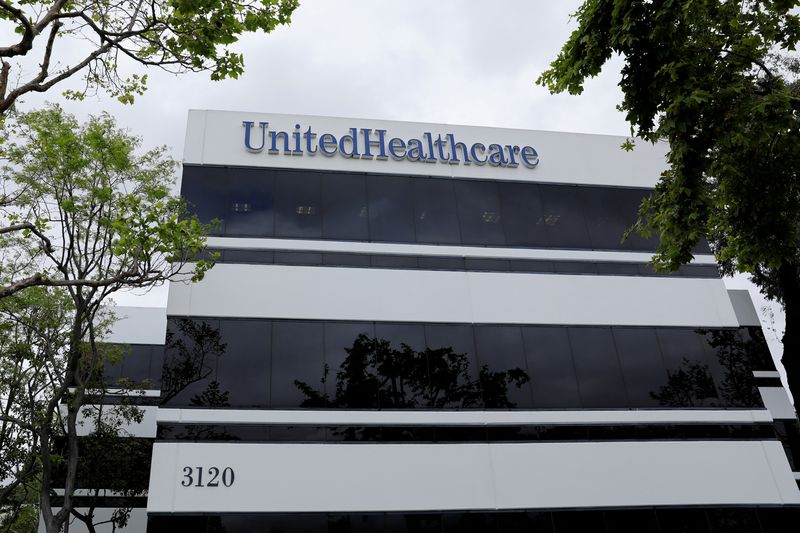By Julie Steenhuysen
CHICAGO (Reuters) - Nearly two weeks after the ransomware attack on UnitedHealth (NYSE:UNH)'s Change Healthcare (NASDAQ:CHNG) unit that has disrupted claims processing across the U.S., doctors are beginning to face a no win choice - stop treating patients or stop paying staff.
The attack, which was disclosed on Feb. 21, shut down the system that many doctors depend on to verify insurance coverage, file claims and get paid, sparking a campaign by hospitals and doctors for the U.S. government to provide financial relief as it did during the COVID-19 pandemic.
On Tuesday the government said it would push its Medicare contractors to provide flexible payment terms.
"We have an impending disaster on our hands," said Mel Davies, chief financial officer of Oregon Specialty Group, an independent practice that treats more than 16,000 patients with cancer, infectious disease and autoimmune conditions.
So far, the practice has found ways to pay the $500,000 to $1 million daily cost of chemotherapy and other intravenous drugs delivered at their infusion centers out of cash flow, but reserves are running low.
"If this doesn't get fixed, we can't treat patients because we won't have the money to pay for labor to even keep our doors open,” she said.
Many practices across the country have been unable to submit insurance claims for reimbursement since the hack, according to the American Medical Association (AMA).
UnitedHealth on its website on Tuesday said as providers implement workarounds, 90% of claims are going through, but added that there are still "a number" of providers who are unable to submit claims or receive payment.
The company said it expects to bring the claims technology fully back online, but not until after it restores its pharmacy services connection, another line of its business brought down by the hack, which it said is targeted for Thursday.
Davies said her practice is exploring lines of credit and other measures as the trickle of payments coming in from insurance companies does not cover their bills.
Although the practice has been able to absorb some of the cost of IV infusions, they have had a major issue with patients who take oral cancer drugs because most of those must be filled at retail pharmacy chains that are also struggling with prescription processing.
"We have to rely on the pharmacies in town to be able to get the prescription, fill the prescription, and get it in the patient's hands without financial devastation,” she said.
Amy Gleason, who works in healthcare IT in Nashville, learned of the hack last week when CVS and another private specialty pharmacy declined to accept the manufacturer's assistance coupons her 25-year-old daughter uses to cover her treatment for Juvenile Dermatomyositis, a rare disease that causes muscle weakness and skin rashes.
Gleason was told by pharmacy staff the system was "broken" and only learned it was part of the Change Healthcare hack when she called a phone number given to her by a pharmacist.
Gleason, whose daughter is still on her insurance policy, last week spent $1,260 out of pocket to cover the cost of Roche’s CellCept, and this week paid $2,500 to cover the cost of Pfizer’s Xeljanz.
'IT'S SCARY'
Ted Okon, executive director of the Community Oncology Alliance, which lobbies on behalf of non-hospital cancer clinics, said oncologists have to deal with a lot of prior authorization before a patient can get expensive treatments. "In many cases, that’s ground to a halt,” he said.
Dr. Howard Luks, an orthopedic surgeon who runs a solo practice in Dobbs Ferry, New York, said the hack has caused significant difficulties in getting approvals for procedures, certain injections or for tests, and there has not been any reimbursement coming in.
Luks left a large academic orthopedic practice two and a half years ago. "We run on razor-thin margins," he said.
He has not had to postpone any elective surgeries, but said it will happen for many patients. "Like anything else, if you can't verify someone's eligibility, it's going to be canceled."
AMA President Jesse Ehrenfeld, a Wisconsin-based anesthesiologist, said one of his patients was forced to reschedule an elective surgery because of difficulties in verifying their eligibility for the procedure.
The hack has taken an especially hard toll on mental health providers.
Laura Steensen is a licensed psychologist and partner at GBCC Behavioral Health, which has six locations in Maryland employing 80 providers and 20 administrative staff and bills insurance companies on a daily basis. Since the hack, they have been unable to bill anything.
Steensen said no patients have been affected so far and she has kept the issue from staff. But she's starting to consider drawing money out of her own retirement savings to cover payroll.
"When you have nothing coming in," she said, "it's scary."
